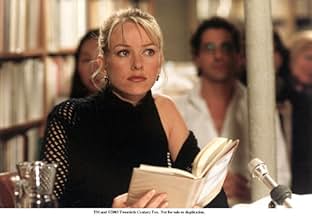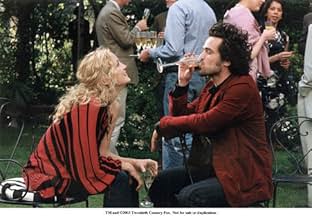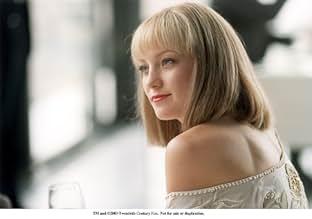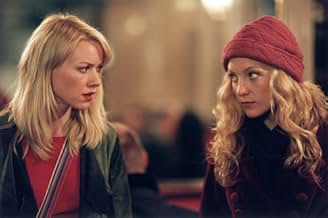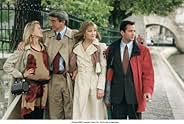Le divorce
- 2003
- Tous publics
- 1h 57m
IMDb RATING
4.9/10
12K
YOUR RATING
French vs. American social customs and behaviors are observed in a story about an American visiting her sister and French brother-in-law and niece in Paris.French vs. American social customs and behaviors are observed in a story about an American visiting her sister and French brother-in-law and niece in Paris.French vs. American social customs and behaviors are observed in a story about an American visiting her sister and French brother-in-law and niece in Paris.
- Director
- Writers
- Stars
- Awards
- 2 wins total
- Director
- Writers
- All cast & crew
- Production, box office & more at IMDbPro
Featured reviews
I keep trying to figure out why this movie is rated so low. I thought it was very good, and that was before I started reading the book -- well more than halfway through, I think it's a faithful adaptation that delivers the storyline and the theme of the novel very well. I tend now to read the novel a movie is based on after I've seen the film, since my experience has taught me that doing the reverse always leads to disappointment in the movie. This was not an error with this title. I think all the casting, all the acting, and especially the direction, were well done.
It seems to me that somehow viewers were expecting too much from the movie. My philosophy is that expectations are arranged disappointments, and I try not to expect anything going in. I do admit that I had some doubts when it seemed that Merchant-Ivory were doing what looked like a light comedy, but there is much more to the book and film than that, first of all, and secondly, why should accomplished filmmakers not move around the genres? Look at Kubrick and The Archers, just to name two, who did so and did it successfully. I wonder how many people went in expecting "Howards End" and thus were disappointed, not in the film but by their own expectations. It's not fair to the filmmakers. Expecting "Le Divorce" to be on par with "Howards End" was like expecting "Howards End" to have the same effect as "Shakespeare Wallah" -- two completely different experiences. It's entirely possible, in fact, that Merchant-Ivory might not have done as good a job on "Le Divorce" had they not made "Howards End" first. It's a matter of process. My point being, that each film must be judged on its own merits.
I've read a couple of comments and message board posts that complain about how the movie makes French people look -- arrogant, garrulous, etc. I think that's overstating a generalization. The movie makes THESE PARTICULAR French people look arrogant and garrulous, because they are -- and devious and self-centered and boorish. But to leap to the conclusion that the movie is making a statement about all French people is patently ridiculous. "The views expressed by the characters in this movie are entirely their own".
On the other hand, one has to remember that Diane Johnson, who wrote the book and a number of books about the culture since, spends half her time in France. She does't take her subjects lightly; she's an intelligent, thoughtful, and though-provoking writer, and I would urge the people who find the movie too subjective to go to its source and read the book. They will find that the book is written from the point of view of one person, and is about the relations between two families -- not two complete cultures. Just because people say something about a culture does't make it true. Perception itself is subjective. In the book (I can't recall if this occurs in the film, I'll have to see it again) Uncle Edgar, perhaps the most sensible character, himself speaks those words that send a shiver of annoyance up my spine: "You Americans. You think..." As if we all think the same thing (and we all know THAT isn't true!). It shows that subjectivity is a common human trait, that we look at the world with our own particular set of blinders, filter our thought through our cultural stance, although I think that perhaps French thought is more synthesized and common than American thought which is, by nature of the population, more diverse.
In the end I think that the book and the film are VERY objective, and let us look at our own judgmental selves and see how the judgmental and subjective nature of our thought and attitude can be damaging and inhibiting. I think that's the theme, and it comes across very well.
It seems to me that somehow viewers were expecting too much from the movie. My philosophy is that expectations are arranged disappointments, and I try not to expect anything going in. I do admit that I had some doubts when it seemed that Merchant-Ivory were doing what looked like a light comedy, but there is much more to the book and film than that, first of all, and secondly, why should accomplished filmmakers not move around the genres? Look at Kubrick and The Archers, just to name two, who did so and did it successfully. I wonder how many people went in expecting "Howards End" and thus were disappointed, not in the film but by their own expectations. It's not fair to the filmmakers. Expecting "Le Divorce" to be on par with "Howards End" was like expecting "Howards End" to have the same effect as "Shakespeare Wallah" -- two completely different experiences. It's entirely possible, in fact, that Merchant-Ivory might not have done as good a job on "Le Divorce" had they not made "Howards End" first. It's a matter of process. My point being, that each film must be judged on its own merits.
I've read a couple of comments and message board posts that complain about how the movie makes French people look -- arrogant, garrulous, etc. I think that's overstating a generalization. The movie makes THESE PARTICULAR French people look arrogant and garrulous, because they are -- and devious and self-centered and boorish. But to leap to the conclusion that the movie is making a statement about all French people is patently ridiculous. "The views expressed by the characters in this movie are entirely their own".
On the other hand, one has to remember that Diane Johnson, who wrote the book and a number of books about the culture since, spends half her time in France. She does't take her subjects lightly; she's an intelligent, thoughtful, and though-provoking writer, and I would urge the people who find the movie too subjective to go to its source and read the book. They will find that the book is written from the point of view of one person, and is about the relations between two families -- not two complete cultures. Just because people say something about a culture does't make it true. Perception itself is subjective. In the book (I can't recall if this occurs in the film, I'll have to see it again) Uncle Edgar, perhaps the most sensible character, himself speaks those words that send a shiver of annoyance up my spine: "You Americans. You think..." As if we all think the same thing (and we all know THAT isn't true!). It shows that subjectivity is a common human trait, that we look at the world with our own particular set of blinders, filter our thought through our cultural stance, although I think that perhaps French thought is more synthesized and common than American thought which is, by nature of the population, more diverse.
In the end I think that the book and the film are VERY objective, and let us look at our own judgmental selves and see how the judgmental and subjective nature of our thought and attitude can be damaging and inhibiting. I think that's the theme, and it comes across very well.
The performances are terrific, Kate Hudson proves that she is the actress that Goldie Hawn never was, and it is always good to see Leslie Caron looking her age and looking great. Now, the matter of the plot has been raised and the consensus so far is that it is a bag of clichés dumped into a blender and then poured out on film.
True. But, the book was no great shakes either and the screenplay simply has not risen above its origins.
I enjoyed Le Divorce for its cynicism and its predictability, frankly. It is nice every now and then to see a movie that elicits a sour chuckle rather than a guffaw or a shriek, and this is one of them.
True. But, the book was no great shakes either and the screenplay simply has not risen above its origins.
I enjoyed Le Divorce for its cynicism and its predictability, frankly. It is nice every now and then to see a movie that elicits a sour chuckle rather than a guffaw or a shriek, and this is one of them.
...because I LOVED this movie. I read the other reviews and I'm astounded. I think this is a great movie. I received the DVD for free, and was so pleasantly surprised by the acting, the scenery, the humor, the exaggerated French snobbishness. I thought Kate Hudson glowed, carrying most of the movie. I loved the lingerie store scene, where the French women giggled over Isabel being "le petite" when she showed them her chest. I loved how Naomi Watt's character was perpetually scowling until she met the handsome divorce lawyer, and visibly fell in love at first sight. Glenn Close was wonderful as the graceful, well-aged American writer, clearly bitter about her being dumped by Edgar, but over-compensating with sarcasm. I loved the scene in the police car, where they were going to investigate a murder, and got side-tracked by the police women's perfume. There are so many wonderful nuances that make this movie great, I don't even care that the plot was muddled and non-existent. It's visually wonderful to watch, and the acting is superb. It's the kind of movie girls like to watch on a weekend, doing their nails, just relaxing. It moves slow, but it's additive and I've watched it more than I'll admit...
Romantic dramas and comedies are not usually my thing, although I admit they can be interesting. Despite myself, I found I liked The Bridges of Madison County (1995), for example. So also with this one: a nice mixture of irony, wry humour, and culture clash (American vs French) all topped off with some murder and financial skullduggery.
There's a large cast of characters, but I'll confine most of my comments to the four main players: Kate Hudson as Isabel Walker, Naomi Watts as her sister, Roxeanne, married to Charles-Henri played by Melvil Poupaud and Isabel's aging lover, Edgar Cosset, played with exquisite panache by Theirry Lhermitte.
The story begins as Charles-Henri is leaving Roxeanne (and his daughter) for another woman, Magda (Rona Hartner), just as Isabel is arriving, from USA, to assist Roxeanne. Essentially, Charles-Henri wants a divorce, but Roxeanne refuses. And for much of the resulting interaction between the couple, that impasse remains. In the meantime, Isabel settles in with Roxeanne and, through the family connections meets Edgar (who is Charles-Henri's uncle) and agrees to become his lover.
The divorce battle gets worse as Roxeanne discovers the inequalities that exist in French law regarding marriage settlements. Relationships sour even more between the two, and now compounded by the growing dispute about a La Tour painting owned by Roxeanne's family but which Charles-Henri now half-claims as part of any divorce settlement. Further drama ensues when Tellman (Mathew Modine) shows up, ranting to Roxeanne about Charles-Henri's seduction of Magda, Tellman's wife.
And, in and out of that mess, Isabel becomes more involved with Edgar, much to the annoyance of Edgar's family but, trust the French to be very civilized about Edgar's affairs and the arrival of Roxeanne's parents and brother (Sam Waterston, Stockard Channing and Thomas Lennon, respectively) who have come to support Roxeanne during her difficult time and, just quietly, to help torpedo Charles-Henri's grab for the La Tour art piece, now valued at multi-millions.
The resolution of all these affairs is competently contrived with many scene changes as the plot interweaves between the two couples, one seeking divorce, the other eventually seeking a divorce of a different kind: as Edgar says to Isabel, finally: "I'm too old for you." And, through the latter half of the story, the American and French families intermingle, giving rise to some delicious moments of that humour and irony already mentioned.
The denouement is predictable, but still enjoyable, and marred only by Mathew Modine's somewhat overacted deranged husband; still, his intervention is instrumental and provides the only real suspenseful moments in an otherwise conventional divorce story. The use of Glenn Close, playing Olivia Pace, as a quasi-mentor for Isabel assists with the story development with Edgar and adds some further touches of irony; however, it added little to the story, as a whole.
As you might expect from an Ivory production, the cinematography, editing, and sound are top notch. And the script, although also somewhat predictable, still shows some moments of brilliance; the lunches and dinners with both families in situ were, for me, a real joy to savour. The acting, apart from Modine, is uniformly very good to excellent. This was the first time I'd seen Kate Hudson on the screen and I think she did well opposite Lhermitte. Watts is always worth watching, as are Channing and Close. And, I was very pleasantly surprised to see Leslie Caron once again, as Edgar's mother.
However, with a lot of sub-titles, some people will be turned off from an otherwise English-speaking film, despite the French actors often lapsing into that language. Being a bit of a Francophile, however, I just found it all quite delightful.
There are some mild and brief sex scenes, and nothing offensive, even for adolescents. It's not a film, however, for those who like action/thrillers.
There's a large cast of characters, but I'll confine most of my comments to the four main players: Kate Hudson as Isabel Walker, Naomi Watts as her sister, Roxeanne, married to Charles-Henri played by Melvil Poupaud and Isabel's aging lover, Edgar Cosset, played with exquisite panache by Theirry Lhermitte.
The story begins as Charles-Henri is leaving Roxeanne (and his daughter) for another woman, Magda (Rona Hartner), just as Isabel is arriving, from USA, to assist Roxeanne. Essentially, Charles-Henri wants a divorce, but Roxeanne refuses. And for much of the resulting interaction between the couple, that impasse remains. In the meantime, Isabel settles in with Roxeanne and, through the family connections meets Edgar (who is Charles-Henri's uncle) and agrees to become his lover.
The divorce battle gets worse as Roxeanne discovers the inequalities that exist in French law regarding marriage settlements. Relationships sour even more between the two, and now compounded by the growing dispute about a La Tour painting owned by Roxeanne's family but which Charles-Henri now half-claims as part of any divorce settlement. Further drama ensues when Tellman (Mathew Modine) shows up, ranting to Roxeanne about Charles-Henri's seduction of Magda, Tellman's wife.
And, in and out of that mess, Isabel becomes more involved with Edgar, much to the annoyance of Edgar's family but, trust the French to be very civilized about Edgar's affairs and the arrival of Roxeanne's parents and brother (Sam Waterston, Stockard Channing and Thomas Lennon, respectively) who have come to support Roxeanne during her difficult time and, just quietly, to help torpedo Charles-Henri's grab for the La Tour art piece, now valued at multi-millions.
The resolution of all these affairs is competently contrived with many scene changes as the plot interweaves between the two couples, one seeking divorce, the other eventually seeking a divorce of a different kind: as Edgar says to Isabel, finally: "I'm too old for you." And, through the latter half of the story, the American and French families intermingle, giving rise to some delicious moments of that humour and irony already mentioned.
The denouement is predictable, but still enjoyable, and marred only by Mathew Modine's somewhat overacted deranged husband; still, his intervention is instrumental and provides the only real suspenseful moments in an otherwise conventional divorce story. The use of Glenn Close, playing Olivia Pace, as a quasi-mentor for Isabel assists with the story development with Edgar and adds some further touches of irony; however, it added little to the story, as a whole.
As you might expect from an Ivory production, the cinematography, editing, and sound are top notch. And the script, although also somewhat predictable, still shows some moments of brilliance; the lunches and dinners with both families in situ were, for me, a real joy to savour. The acting, apart from Modine, is uniformly very good to excellent. This was the first time I'd seen Kate Hudson on the screen and I think she did well opposite Lhermitte. Watts is always worth watching, as are Channing and Close. And, I was very pleasantly surprised to see Leslie Caron once again, as Edgar's mother.
However, with a lot of sub-titles, some people will be turned off from an otherwise English-speaking film, despite the French actors often lapsing into that language. Being a bit of a Francophile, however, I just found it all quite delightful.
There are some mild and brief sex scenes, and nothing offensive, even for adolescents. It's not a film, however, for those who like action/thrillers.
After viewing the unfortunate "Golden Bowl" (also by James Ivory) the day before, an exposure to "Le Divorce" was certainly a refreshing sip of champagne. This may be the first James Ivory movie I've seen where I forgot to look at the sets (unlike Ivory's other French venture, "Jefferson in Paris"). This is mostly due to the depth of certain actors and the fact that this time Ivory decides to close in on them rather than frame them. When the book came out, as an American living in Paris for 30 years, I avoided reading another set of American observations on everything French that foreign residents here hate, and I can't say that the movie avoids the pitfalls of throwing around generalities. Yet this is kept to an astonishing minimum, perhaps because few of the main characters really consider themselves typical representatives of their native country. Instead of a plethora of reflections coming out of their mouths, "the French are like this, the Americans are like that," the viewer can actually draw his own conclusions about which country has the "nicest" people and the place of formality when it comes to private matters. After all, would the story have been that much different if it had dealt with class differences in New York City? The characters who do tend to generalize are perhaps the least involved in what is going on. They form the real "décor" of the film, rather than the wallpaper and polished furniture, although these elements certainly haven't been omitted.
I find it strange that the two most interesting actors are supposed to belong to the subplot, Kate Hudson and Thierry L'Hermitte. The latter is currently being wasted in his late middle age in French films, and, like Louis Jourdan in "Gigi," manages to bring a little subtle something extra to the most stereotyped part in the film. I'd like to see him extend what he has done here, if any producer or director can be bothered.
The film had such a short run in France that I missed seeing it in a movie theater, and it was dismissed by most French critics on its release like the way that some of the American characters are dismissed by their French counterparts in the film itself. It would be a shame to overlook this light but not lightweight effort, for it has a surprisingly natural charm and raises interesting questions about how much the culture that forms our conditioning influences our very humanity.
I find it strange that the two most interesting actors are supposed to belong to the subplot, Kate Hudson and Thierry L'Hermitte. The latter is currently being wasted in his late middle age in French films, and, like Louis Jourdan in "Gigi," manages to bring a little subtle something extra to the most stereotyped part in the film. I'd like to see him extend what he has done here, if any producer or director can be bothered.
The film had such a short run in France that I missed seeing it in a movie theater, and it was dismissed by most French critics on its release like the way that some of the American characters are dismissed by their French counterparts in the film itself. It would be a shame to overlook this light but not lightweight effort, for it has a surprisingly natural charm and raises interesting questions about how much the culture that forms our conditioning influences our very humanity.
Did you know
- TriviaThe painting sold before Roxy's LaTour is Claude-Joseph Vernet's "La Nuit, au Port au Clair de Lune", which is in the Louvre's permanent collection.
- GoofsWhen Isabel and Edgar have their last outing together, Isabel is clearly wearing red nail lacquer in the restaurant. When they say goodbye outside, her nails are no longer red.
- SoundtracksQu'est-ce qu'on Attend pour Être Heureux ?
Music by Paul Misraki
Lyrics by André Hornez
Performed by Patrick Bruel and Johnny Hallyday
- How long is The Divorce?Powered by Alexa
Details
- Release date
- Countries of origin
- Official sites
- Languages
- Also known as
- The Divorce
- Filming locations
- Production companies
- See more company credits at IMDbPro
Box office
- Gross US & Canada
- $9,081,057
- Opening weekend US & Canada
- $516,834
- Aug 10, 2003
- Gross worldwide
- $12,991,996
- Runtime1 hour 57 minutes
- Color
- Sound mix
- Aspect ratio
- 2.39 : 1
Contribute to this page
Suggest an edit or add missing content









